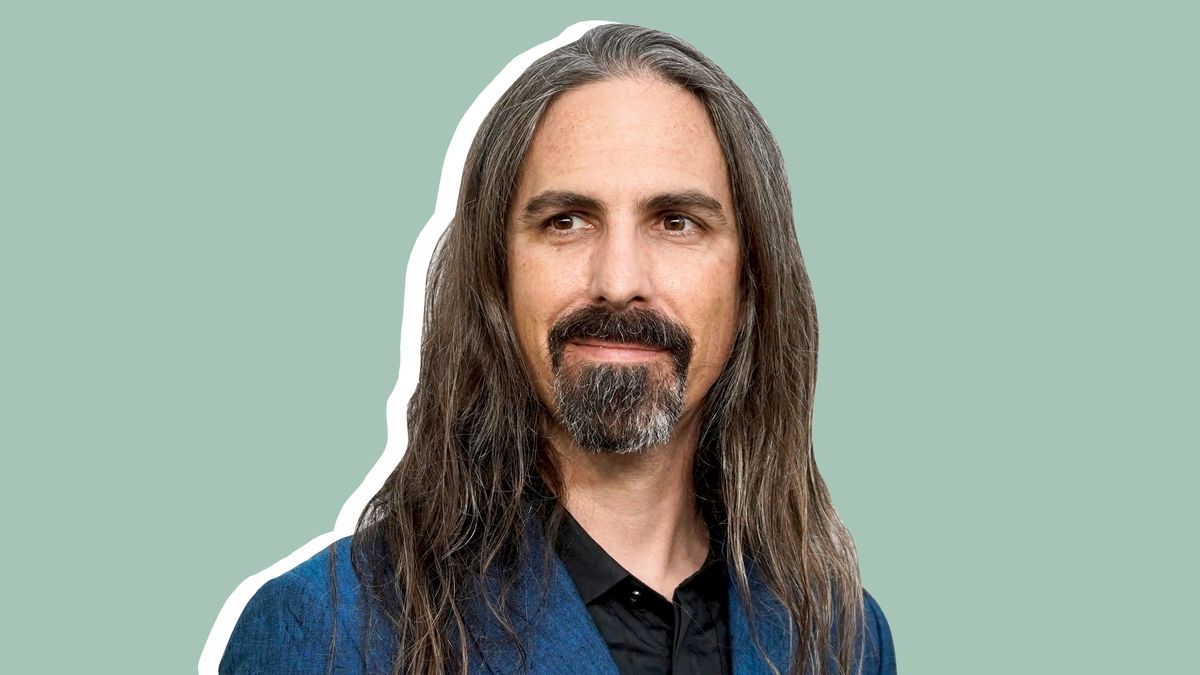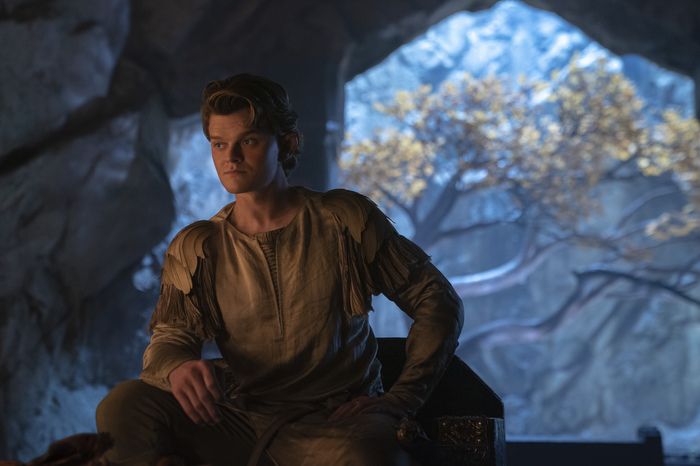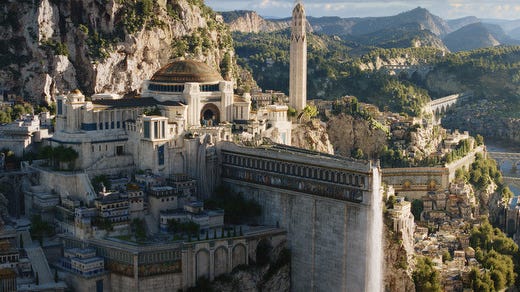Bear McCreary was just a college student when The Lord of the Rings: The Two Towers premiered back in 2002. But the lifelong Tolkien fan—who, years later, would become the composer of Amazon's Rings of Power—already had an idea of the musical score he would write. Growing up in Bellingham, WA, the dewy evergreen trees and snowy mountains in the Pacific Northwest mirrored the vivid world of Middle-earth in his imagination. "It's a very Shire-like community," McCreary tells me. "I loaded that into my brain and The Two Towers opens flying over the mountains in New Zealand. It was like it was alive for me. I thought, ‘I was just there!’"
Rings of Power is the first billion-dollar streaming series, making it the most expensive TV ever produced. The show follows Peter Jackson's The Lord of the Rings film trilogy, which is not only among the highest-grossing film series of all time, but netted the only Academy Award for Best Picture ever given to a high fantasy adventure series. You can hear the legacy (and the massive budget!) in Bear McCreary's score for the new prequel series, which features a roughly 90-piece orchestra, a 40-voice-deep choir, and some of the best instrumental soloists—all filled to capacity in London's legendary Abbey Road Studios.
In his career so far, McCreary scored some of the most seminal fantasy series franchises of the modern era, including The Walking Dead, Battlestar Galactica, Outlander, Marvel's Agents of S.H.I.E.L.D., and even video games. (God of War, ever heard of it?) They've all led to his magnum opus in The Rings of Power—an all-encompassing work, which combines his industry experience with his own intense fandom. The challenge, McCreary says, was "unlike anything else I had ever faced."
It took McCreary over a year of planning to flesh out 37 unique tracks and compose the nearly two and a half hours of music that make up The Rings of Power's original soundtrack. Throughout the journey, he explored new characters, expanded the musical identity of popular heroes like Galadriel and Elrond, and scored previously unseen cities, like Numenor—the major highlight of Episode Three. Finally able to take a breather and enjoy the show as a fan, the composer has nothing but unbridled enthusiasm for the road ahead.
ESQUIRE: I just finished Episode Three—we finally get to see Numenor! I know you previously told fans at the premiere that Rings of Power would surprise them. How do you feel that the reception has been so far now that it's out?
Bear McCreary: I think the reception has been fantastic. And I got to say, particularly with Episode Three—as a fan of the books and the films—the idea of seeing Numenor realised in big budget, on-screen glory is something I have been curious about for a large percentage of my life. I’m just now seeing early reactions to Episode Three and it’s all everything I would have hoped for. And that’s just me speaking as a fan watching the show! To be able to write music for that, just as a fan, I’m so excited about Episode Three and beyond.
What has that experience been like—to not just have this amazing opportunity to follow Howard Shore’s iconic score, but to also be a longtime fan of this world and get to add a piece of it yourself?
BM: Well, that’s a perfect way to describe it. I get to add a piece to the puzzle—to contribute something to a larger body of work that I have been consuming my entire life. I mean, I think I was ten years old when I read The Hobbit, and there’s music baked into that story right in the first chapter. Even then, I remember thinking, "Wow, this world is very musical." When this new show was announced, it was far enough along in my career that I allowed myself the indulgence to think, What If I got to score that show? And that really was a dream to even be considered—which I was at that time. But it really was a dream come true to then be able to use that skillset that I developed over my years of being a fan of science fiction, fantasy, and horror movie soundtracks. It shaped the course of my life, and to be able to use those skills to give something back to the larger The Lord of the Rings mythology is incredible. It’s really a wonderful feeling.
Was there anything you learned from your past work on fantasy projects—like God of War or Outlander—that you were able to bring to The Rings of Power?
Absolutely. Not only was there the legacy of Howard Shore’s iconic work, but we also have primary protagonists and characters in six different cultures. Each of those different cultures—the Harfoots, the Elves, the Dwarves, the Low Men, the High Men, and the Orcs—required a unique style of music, instruments, and musical traits. Plus, you have two characters outside of all those cultures, "The Stranger” and Sauron, as well as eight different languages that I had to write in that all fit within the broader umbrella of The Lord of the Rings. So, it’s not that previous work influenced this work, it’s that I went back to those same wells and drew from the same influences as before.
When I hear the melody of Numenor, to me, it feels very much like the kind of big anthems that were definitely a big influence on Foundation. The Nordic influences that I researched and drew from when I scored God of War—the Swedish nyckelharpa, the Nordic Hardanger fiddle, the hammered dulcimer—ended up in the Southlands. The dwarves ended up with deep male vocals. In Battlestar Galactica, at the beginning of my career, I explored middle Eastern and Japanese percussion that got pulled into the score. Also—it should be obvious—my love of Celtic music that I explored in Outlander ended up being useful for the Harfoots. So, in a way, I had to use everything that I’ve ever loved and use it to help create a sense of distinction for each of these cultures.
Did you have a favourite character that you were working on, as a fan from when you were younger, that made you think, Wow, I finally get to score this character’s journey?
I do, but that was actually the problem. It was Elrond. Of all the themes that I wrote, Elrond was the one that I struggled with the most. And really, I have to give a shoutout to [showrunners] J.D. Payne and Patrick McKay for helping guide me through the character and story as he exists now. Because, from the books and the Peter Jackson films, I have this image of Elrond as a wise, authority figure. And yet, the Elrond we meet in The Rings of Power is younger. I had to forget that character that I loved from the books for a moment and really focus on who he is when we meet him now. I wrote this theme that is very wistful, innocent, and starry-eyed—but it also has this turn in it. So, in a way, my love of the books sometimes meant that I went down the wrong path at first because I want to tell a story that evolves into that. But it was really fun to navigate those musical challenges.
Plus, I imagine that you had to develop a lot of these themes before you ever saw footage of the show. What was it like when it finally came together?
BM: Yeah, I generated a list of themes after I read the script and spoke with the showrunners at length. And I was also able to watch the first two episodes in a rough form. But that meant that I was not yet able to see Numenor or get a good look at the orcs. I had to write the themes for the whole season, but the story was so vivid in my imagination that it wasn’t a problem. I’ve been thinking about it my whole life. I formed an image in my mind of what I wanted those themes to feel like, and truly, when I wrote those themes, the only concern was if the visuals would live up to them. I wrote my Numenor theme, and I was really proud of it. It captured everything I wanted Numenor to feel like. It felt like Camelot. When I finally saw the footage, it just blew me away. To me, the reveal of Numenor in Episode Three was one of the most magnificent sequences that I had the opportunity to score in my career.
You were able to go into the studio and conduct the final episode after about two and a half years of being away due to the pandemic. What it was like being back in person and experiencing your music live?
It was an incredible experience, and one of my fondest memories of scoring this first season of The Rings of Power. Doing weekly television, I would conduct, without exaggeration, 50 live sessions a year for multiple years in a row. Then, that all came to a halt. I conducted the finale of Marvel’s Agents of S.H.I.E.L.D. not knowing that it would be two and a half years before I would conduct an ensemble again. I was writing music every single day for nine months in order to get all the Rings of Power music written... and that feeling of being up in front of those musicians and feeling the air hitting my body—the resonance through the floor and the podium—I almost wept. And in fact, after the first take, I did break down a little bit. It was very moving, and it felt really good to be back up on the podium and making music in real time—doing what I’ve always loved to do.
Josh Rosenberg is an Assistant Editor at Esquire, keeping a steady diet of one movie a day. His past work can be found at Spin, CBR, and on his personal blog at Roseandblog.com.














